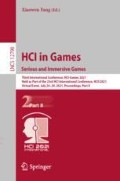Abstract
It has been generally considered as one of the effective ways of teaching reform to add gamification into college courses. This study mainly discusses the specific methods of improving the learning effect of university courses through gamification, and tries to put forward a set of design framework and apply it to a university course. From the perspective of learning engagement, this paper analyzes the effect of gamification design and application, and investigates the relationship between gamification learning experience, learning motivation, personality traits and learning engagement. The significance of this study lies in, on the one hand, enriching the practical experience of improving learning engagement through gamification, on the other hand, providing reference for constructing the theoretical model of the relationship between gamification and learning engagement.
Access this chapter
Tax calculation will be finalised at checkout
Purchases are for personal use only
References
Kapp, K.M.: The gamification of learning and instruction: game-based methods and strategies for training and education. In: The Gamification of Learning and Instruction: Game-Based Methods and Strategies for Training and Education. San Francisco, CA, Pfeiffer (2012)
Jiang, Y., Shang, J., Zhuang, S.: Design and application of game-based inquiry learning model. China Educ. vol. 5, 84–91 (2011) [in Chinese]
Marache-Francisco, C., Brangier, E.: Process of gamification. from the consideration of gamification to its practical implementation. In: Centric: the Sixth International Conference on Advances in Human Oriented and Personalized Mechanisms (2013)
Morschheuser, et al.: How to design gamification? A method for engineering gamified software. Information and Software Technology (2018)
Li, C.: Embodied cognition and game learning : return and innovation of adult training. Adult Educ. 6 (2017) [in Chinese]
Dicheva, D., et al.: Gamification in education: a systematic mapping study. J. Educ. Technol. Soc. 18(3), 75–88 (2015)
Huang, R.H., Ma, D., Zheng, L.Q., Zhang, H.H.: Curriculum design theory based on blended learning. Electr. Educ. Res. (01 ), 9–14 (2009). [in Chinese]
Werbach, K., Hunter, D.: For the Win: How Game Thinking can Revolutionize your Business. Wharton digital press, Newark (2012)
Zichermann, G., Christopher, C.: Gamification by design: Implementing game mechanics in web and mobile apps. “ O’Reilly Media, Inc.”, 9 (2011)
Aldemir, T., Berkan, C., Goknur, K.: A qualitative investigation of student perceptions of game elements in a gamified course. Comput. Hum. Behav. 78, 235–254 (2018)
Chou, Y.: Actionable gamification - Beyond points, badges, and leaderboards. Packt Publishing Ltd, Birmingham (2019)
Chapman, J.R., Peter, J.R.: Does educational gamification improve students motivation? If so, which game elements work best? J. Educ. Bus. 93(7), 315–322 (2018)
Mengcheng, W., Dai, X., Yao, S.: The preliminary preparation of the Chinese big five personality questionnaire III : the formulation of the simplified version and the reliability and validity test. Chin. J. Clin. Psychol. 4 (2011) [in Chinese]
Chi, L., Xin, Z.: Measurement of college students learning motivation and its relationship with self-efficacy. Psychol. Dev. Educ. vol. 22(2), 64–70 (2006) [in Chinese]
Wang, Z., Bergin, C., Bergin, D.A.: Measuring engagement in fourth to twelfth grade classrooms: the classroom engagement inventory. Sch. Psychol. Q. 29(4), 517 (2014)
Skinner, E., et al.: Engagement and disaffection in the classroom: part of a larger motivational dynamic? J. Educ. Psychol. 100(4), 765 (2008)
Kong, Q.-P., Wong, N.-Y., Lam, C.-C.: Student engagement in mathematics: development of instrument and validation of construct. Math. Educ. Res. J. 15(1), 4–21 (2003)
Ghaban, W., Robert, H.: How different personalities benefit from gamification. Interact. Comput. 31(2), 138–153 (2019)
Buckley, P., Doyle, E.: Gamification and student motivation. Interactive Learning Environments, 1–14 (2014)
Buckley, P., Doyle, E.: Individualising gamification: an investigation of the impact of learning styles and personality traits on the efficacy of gamification using a prediction market. Comput. Educ. 106.MAR., 43–55 (2017)
Qu, X., Zeng, J., Shang, J.: Research on MOOC gamification design model from the perspective of situational stories. China Distance Educ. (Integrated Edition ) 000.012, 24–33 (2019). [in Chinese]
Zhu, Y., Pei, L., Shang, J.: Research on the integration of game and MOOC video - - Taking the MOOC course of Gamification teaching method as an example. J. Distance Educ. 6 (2017). [in Chinese]
Acknowledgements
This study is funded by The Key Education Research Project in 2020 Sponsored by Yuyue Educational Development Foundation in Center for Research on Pre-K12 Education of Peking University (No: JCJYYJ201902).
Author information
Authors and Affiliations
Corresponding author
Editor information
Editors and Affiliations
Rights and permissions
Copyright information
© 2021 Springer Nature Switzerland AG
About this paper
Cite this paper
Yao, Y., He, L., Shang, J. (2021). Design and Application Research of Gamification in University Curriculum——Taking the Course of TV Camera for Example. In: Fang, X. (eds) HCI in Games: Serious and Immersive Games. HCII 2021. Lecture Notes in Computer Science(), vol 12790. Springer, Cham. https://doi.org/10.1007/978-3-030-77414-1_20
Download citation
DOI: https://doi.org/10.1007/978-3-030-77414-1_20
Published:
Publisher Name: Springer, Cham
Print ISBN: 978-3-030-77413-4
Online ISBN: 978-3-030-77414-1
eBook Packages: Computer ScienceComputer Science (R0)

